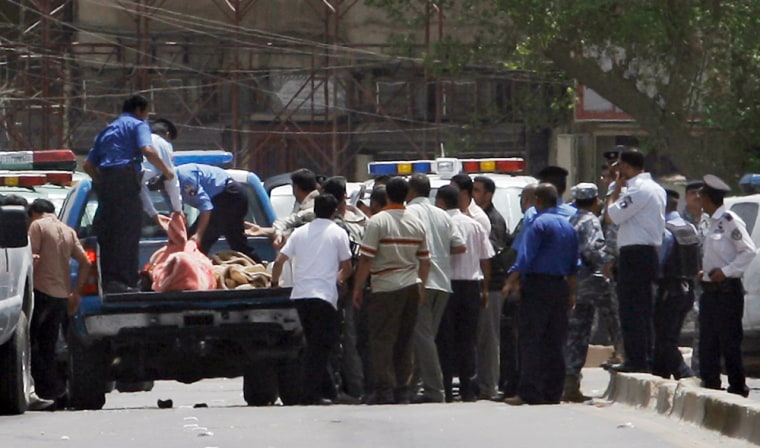Five members of Iraq's security forces charged in a deadly bank robbery went on trial Sunday, as relatives of those killed in the heist beat and spat on the defendants. One relative was dragged away from the courtroom, screaming obscenities.
The case of the robbery has threatened to become a political maelstrom in Baghdad, after at least one of the suspects was linked to a senior official in a major Shiite party.
Gunmen broke into the state-run Rafidain Bank at about 4 a.m. on July 28, killing three on-duty guards and five others on the premises who were either on a break or asleep, according to police investigators. The bank's chief testified Sunday that 5.6 billion Iraqi dinars — or about $4.8 million — was stolen.
Most of the money was later recovered in the office of a newspaper owned by Iraqi Vice President Adel Abdul-Mahdi, a senior member of Iraq's largest Shiite party, investigators said.
Abdul-Mahdi has denied any involvement but said one of those charged in the robbery worked as part of his security detail. He has said any suggestion of wrongdoing on his part was a politically motivated attempt to tarnish his chances in the upcoming national elections.
All five defendants were identified Sunday as members of Iraq's security forces — four police officers and one soldier. The men, who were dressed in brown jumpsuits, denied any involvement in the robbery.
It was not immediately clear whether the soldier in custody was a member of Abdul-Mahdi's detail, or whether it was one of the three suspects who police have said remain at large.
Relatives express anger
As Sunday's hearing opened, two of the defendants yelled at the judge: "We have nothing to do with the robbery."
The judge ordered them to "be silent" and minutes later, a relative of a slain bank guard attacked one of the defendants, beating him and cursing, while another man was forced from the courtroom after screaming obscenities at the men on trial.
A woman, who later identified herself as the mother of one of the slain guards, spat on the defendants as they left the court. She fainted outside the courtroom and was carried away by police.
Relatives were also angry at the chief judge for adjourning the trial at Baghdad's criminal court until Thursday to give the three-judge panel more time to investigate.
The chief judge ordered the five suspects held without bail. The judges were not identified, according to the rules of the court. Judges in Iraq are often targeted for assassination.
Maan Hussein, the head of the bank, told the judges Sunday that about 5.6 billion Iraqi dinars was stolen. Initially, police had said the gunmen made off with 8 billion Iraqi dinars ($6.9 million). Hussein said 263 million dinars (about $223,000) has still not been recovered.
Abbas Hussein, whose brother was killed during the robbery, said outside the courtroom that he wanted swift justice.
"Today's trial should not make us forget the others who are still at large," he said.
Insurgency attacks
Armed robberies targeting banks and jewelry stores have been on the rise, even as Iraqi security forces continue to fight a waning insurgency that remains capable of pulling off attacks.
An American soldier died of injuries sustained during an attack Sunday on a U.S. patrol in Baghdad, the U.S. military said in a statement. It did not identify the Multi-National Division-Baghdad soldier pending notification of next of kin.
The U.S. military did not release any details about the attack, though an Iraqi army official said a roadside bomb struck the patrol just north of Baghdad. The official spoke on condition of anonymity because he was not authorized to release the information.
The death raises to at least 4,335 members of the U.S. military who have died in the Iraq war since it began in March 2003, according to an Associated Press count.
In northern Iraq, gunmen on Sunday attacked a police checkpoint in Mosul, killing one police officer, a police official said. In Baghdad, the Iraqi army rounded up dozens for questioning over Saturday's attack on a police checkpoint in the Azamiyah district that left two officers dead, said another official.
Both officials spoke on condition of anonymity for the same reason as the army official.
Shadow over Ramadan
The recent violence, including Wednesday's attacks that targeted government buildings in Baghdad, has cast a long shadow for some over Ramadan, the Islamic holy month of fasting.
Ahlam Hussein, 42, who lives in eastern Baghdad, said the attacks tarnished the celebration for her family.
"The tragic situation we live in takes us away from the spiritual and moral significance of Ramadan, especially since this year it came after a bloodbath," she said.
But Hussar Sale, 35, who lives in Baghdad's primarily Sunni neighborhood of Azamiyah, said the fear of more bombings was not keeping him from his Ramadan traditions. "It is an issue every person faces as we challenge terrorism," he said.
Meanwhile, one of Iraq's most powerful Shiite leaders has been hospitalized in Iran after suffering a setback while being treated for lung cancer.
Abdul-Aziz al-Hakim was admitted to the hospital on Saturday after his health deteriorated, according to a statement by his party, the Supreme Islamic Iraqi Council.
Al-Hakim has wielded enormous influence since the 2003 U.S. invasion as head of the biggest Shiite party, maintaining close ties to both the Americans and his Iranian backers.
More on: Iraq
